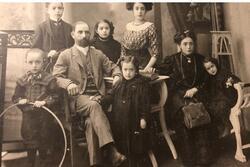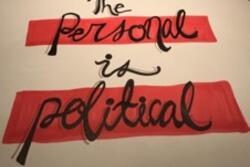Let’s Talk about the C-Word
Anyone who knows me well knows that I curse like a sailor. I love cussing—I think it’s a healthy way to express intense emotion. However, I do draw the line at some really offensive words and phrases, one of which is the C-word.
The C-word is a derogatory term for a vagina. It’s derived from several Germanic languages and was used frequently in the Middle Ages. Today, it’s considered one of the most shocking and demeaning swear words in the English language, especially when it’s used in reference to women. Despite its negative connotations, the word is also being reclaimed in some feminist spaces in an effort to turn it into a positive term and take power away from those who use it in a derogatory way.
While I can understand why some feminists want to reclaim this word, I personally believe it’s one of the vilest things you can say to or about someone. It’s indicative of our society’s contempt and disgust for the female sex—the C-word boils people down to a body part, the vagina, and further describes it as something dirty and obscene. To put it simply, it’s dehumanizing.
So, when I heard one of my male friends use it casually, I was pretty shocked. I immediately jumped to correct him, and explained my deep discomfort. I expected him to apologize immediately and understand my distaste for the word.
Instead, he pushed back against my protests. He argued that he had a right to say what he wanted, that he wasn’t directly calling anyone the C-word, and that I shouldn’t let it bother me.
I felt betrayed. At the time I couldn’t articulate it, but I think what bothered me most was that my friend brushed off my request so easily, even after he knew how much his use of the C-word bothered me. This is someone who I really trusted and loved, so the fact that my feelings didn’t seem to matter to him at all was really hurtful.
If I could go back in time, I would explain how belittled I felt. I’m no stranger to getting pushback for my views—as someone who loves to engage in tough discourse, I’m very familiar with having my opinions challenged. I have no problem arguing with my friends about problematic behavior, but the deeply personal nature of this particular conflict is what makes it stand out.
My friend does not have the right to unequivocally decide what’s offensive and what isn’t. He can’t fully understand my perspective because he’s not a woman, nor does he have a vagina, so his insistence on continuing to use this word is short-sighted. On my end, I could have done a better job explaining how the use of the C-word promotes the power imbalance between men and women. I could have better explained the connotations behind the word. If I had been able to show my friend that my protests came from a place of fear and distress, he might have reacted differently.
Then again, I may be giving him too much credit in this hypothetical scenario. Even if I could go back and better explain my feelings to him, he still might write me off as being too sensitive. It seems like a lot of people, especially those who possess more societal privilege, have a hard time acknowledging that their actions may be perpetuating power structures that are meant to keep marginalized people down. It’s natural to get defensive when we get called out for engaging in harmful behavior like saying the C-word, especially when we can’t fully grasp the gravity of the behavior’s connotation. Nevertheless, we can at least try to understand and refrain from acting in ways that might make some people uncomfortable. No one is really exempt from being problematic, but we can all learn from it. If we were all more open to correcting our ingrained, harmful behaviors, we would have a far better understanding of and respect for one another.
Communication and education are intrinsic parts of civil society—incorporating different perspectives into our range of knowledge, and respecting one another based on what we learn from those perspectives, are key to creating a society that benefits all of us. Maybe in small ways, with meaningful conversations, we can all make the world a little more understanding.
This piece was written as part of JWA’s Rising Voices Fellowship.








Still don't know what the C word is.
I think that you have described very clearly why anyone should think carefully before broadcasting the "c" word. As you have described, this word is intended to convey all of the possible negative connotations available. The closest analogy would be to shout "hitler", with the exception being hitler equates power with evil. Power is considered to suggest respect. I hope that anyone you identify as a friend would hear your words in opposition to the normalization of the ignorant misuse of this word and respect the personal consequences of using it to express frustration.
thank you so much
Now you're talking!
The c-word for people who use the c-word is Coward.
Being called the c-word is no different than using the d-word when putting down men. It’s a word. If you give it more power than it has, that’s on you. This is another female perspective.
I am an Australian. The c-word was first used on Australian free to air television by a famous feminist in 1986 in a show called The Pack of Women. It does not hold the same gravitas or power here that it seems to in your part of the world. Whilst the second meaning for the c-word is an unpleasant or stupid person it is the primary use for the c-word in this country. So as well as Britain don't come to our sunny shores if offence is taken by the use of the c-word. Context is everything. I hear what you saying though. There are a lot of unpleasant and stupid people out there. It can be heard along with the other offensive words f, s and others on our free to air television here in the lucky country. No pun intended.
Whatever you do don’t move to England.!
Words have absolutely no meaning when spoken,unless there is action behind them . I am to confident to care what people call me .
The way you use and think about language is incredible!
this article reflects my views on the subject and is written better than I ever could
Very well written!
The only "c-word" I use is "Chocolate!"